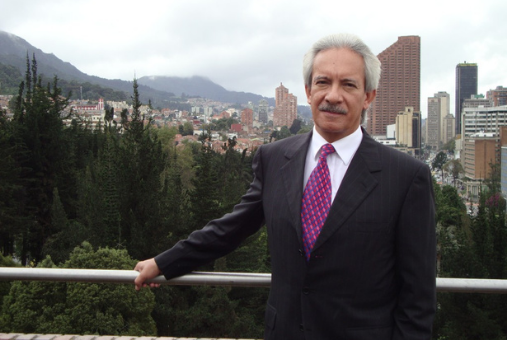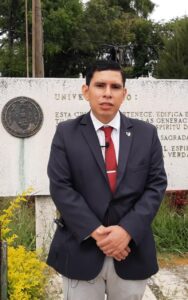The Guatemalan Public Prosecutor's Office built a case against journalist and owner of elPeriódico, José Rubén Zamora, for alleged money laundering in just 72 hours in July 2022, Rafael Curruchiche, head of the Special Prosecutor's Office Against Impunity (FECI, by its Spanish acronym), told El Faro at the time.
Based on a single witness, on July 29 of that year the Public Prosecutor's Office ordered Zamora's arrest and the search of the news outlet's offices and his home, and held eight media workers incommunicado for 16 hours. March 29 marked eight months the journalist has been detained in the Mariscal Zavala prison in Guatemala City.
His situation, which by itself has raised alerts from different press freedom organizations and press associations, would be part of an alleged larger scheme that would include different branches of government with the purpose of silencing the press and political opponents, as well as to persecute and corner justice operators and lawyers who handle media cases, all in the midst of an electoral campaign marred by allegations of corruption and irregularities.
José Rubén Zamora seems to have become a perfect example to intimidate the press. At least that is how Marielos Monzón, Guatemalan journalist and one of the promoters of the 'No Nos Callarán' group of the Press Against Censorship collective, sees it. For Monzón, Zamora is the best "exemplary case" that the Guatemalan government has found to let the press know the consequences it could face if it continues with its investigative work and denounces corruption.

José Rubén Zamora, periodista guatemalteco, fundador y director de elPeriódico. (Foto: Cortesía)
Zamora is perhaps the country's most well-known journalist. He has received, among others, the International Press Freedom Award from the Committee to Protect Journalists (CPJ) and the Maria Moors Cabot Award from Columbia University, both in 1995. In 2021, elPeriódico, a news outlet he founded, received the King of Spain Award as an outstanding news outlet in Ibero-America.
"It was an exemplary choice," Monzón told LatAm Journalism Review (LJR). "They did it with José Rubén [Zamora] - What were they thinking? An award-winning, well-known journalist like José Rubén, a person who has a lot of weight in the country... If that happened to him, it could happen to any of us. That is to say, it sets an example. If we did it to him, we can do it to anyone.”
But the persecution against Zamora is not only due to his international recognition, but also in retaliation for what he and his team published in elPeriódico, founded in 1996. Since the beginning of Alejandro Giammattei's administration (Jan. 14, 2020) and up to the time of Zamora's arrest, that is, in 137 weeks, elPeriódico had published every week an investigation on alleged corruption cases that included irregular processes or contracts awarded to friends of the administration. The investigation that allegedly caused the most discomfort would’ve been that of a business deal with a Russian company to exploit a mine. A business deal in which President Giammattei allegedly received money.
"Prosecutor Curruchiche said it had nothing to do with him being a journalist. 'No,' he said. 'This has nothing to do with his news outlet. This is because he is a businessman.' Then they canceled the news outlets outlet's bank accounts, then they raided the news outlet, then they went and intimidated the news outlet's advertisers, then the news outlet had to close, and now they are investigating eight journalists and columnists. Obviously, it’s something against the media, against the press," Monzón said.
An interpretation also made by the Guatemalan lawyer and expert in international law and human rights, Christian González.
"It does appear [to be] a reprisal for the exercise of freedom of expression. The process itself seems to be a reprisal for Zamora's criticism," González told LJR. For the lawyer, elements such as the fact that on the day of Zamora's arrest one of his sons had been arrested or that the news outlet had been forbidden from continuing to print, and even journalists were barred from entering the news outlet's building, raise suspicions as to whether due process is being complied with.
"[This measure] would have nothing to do with the process, it would not be a legal measure. Things like this raise doubts about the legitimacy of the legal process and whether it is advancing in keeping with the due process recognized by the Constitution and international standards. It seems that the point is to break elPeriódico," González said.
In addition to these irregularities, there have been complaints of harassment of justice operators and defense attorneys that call into question the independence of the country's judiciary. Throughout these eight months, at least four of Zamora's defense lawyers have resigned and one of them is even in prison linked to a judicial process.
Mario Castañeda, Zamora's former lawyer and former prosecutor, was imprisoned in a maximum security prison along with dangerous criminals, such as drug traffickers, whom he had sent to jail when he was a prosecutor. He eventually accepted charges to ease his conditions, damaging Zamora's court case.

Marielos Monzón.
"They are rounding up all the people — family members, the inner circle, columnists, journalists, lawyers — to really leave him defenseless, but also to have the elements to accuse and convict him," Monzón said.
Warnings about lack of judicial independence are not new. From the time former President Jimmy Morales expelled the International Commission Against Impunity (CICIG) from the country in 2019, at least 20 justice operators have gone into exile, many of them to the United States. Then-Attorney General, Thelma Aldana, who currently is under three arrest warrants, is in Washington.
Additionally, the U.S. State Department has linked at least five current justice operators to its Corrupt and Undemocratic Actors List. Among them are the head of the FECI, Rafael Curruchiche, who also leads the case against Zamora; two criminal court judges, two magistrates of the Supreme Court of Justice, and recently, the current attorney general, María Consuelo Porras Argueta de Porres, was pointed out for "her participation in significant acts of corruption."
"These circumstances make it very doubtful that, in Zamora's case, procedural guarantees are really being complied with," González said.
Guatemala's Public Prosecutor's Office opened the investigation against Zamora after former banker Ronald García Navarijo denounced the journalist for having given him close to $300,000 quetzales (about US $40,000) to allegedly launder the money.
Zamora and his defense have accepted that the money was given to García Navarijo, but claim that the money was given to Zamora and elPeriódico by two Guatemalan businessmen who wanted to help the news outlet. Due to a financial boycott against the media, the businessmen could not deliver the money directly. According to the newspaper, they have been suffering a commercial boycott by the State for years.
Zamora, who had known García Navarijo for years as manager of the Banco de los Trabajadores [Workers’ Bank] and as a source for the newspaper, asked the former banker to reenter the money to the banking system, among other things, to pay the payroll of elPeriódico. According to his defense, Zamora gave him the money and he gave him a check, which they eventually noticed had no funds.
These two aspects were highlighted by his defense because they would demonstrate that the crime of money laundering does not apply in this case: First, the money has a licit origin because it comes from businessmen (in fact, at first the prosecution would have shown the money in question with the bank tapes that would show they were withdrawn from the system. The bank slips disappeared when the money was presented again as evidence). And second, the money never re-entered the banking system because the check had no funds. According to the defense, García Navarijo not only swindled the journalist, but also suspects that the whole thing was a set-up.
However, based on García Navarijo's testimony, Zamora was charged with money laundering and sent to prison. The same accusation also included the manager of elPeriódico (who later accepted charges in order to be released) and the assistant prosecutor of the FECI, Samari Carolina Gómez Díaz, for leaking confidential information. The accusation against this prosecutor has also been pointed out by the defense as part of the persecution of justice operators.
The José Rubén Zamora case is not only dangerous for what it means for the journalist himself, his news outlet and even his team, but also for the implications it has had at a general level for the press in Guatemala and for the free exercise of freedom of expression.
On Feb. 28, for example, the prosecutor's office added a charge of "conspiracy to obstruct justice" to its first indictment. According to prosecutor Cinthia Monterroso, Zamora would have mounted a smear campaign against justice operators through publications in elPeriódico, with the help of others.
For this reason, in the same hearing, the prosecutor's office requested to open an investigation against eight journalists and a columnist of the newspaper for the same crime. Prosecutor Monterroso even asked the judge to investigate the sources of financing of the news outlet and journalists. The judge accepted the prosecutor's request.
"In reality, international standards for the protection of freedom of expression are very strict. And when it comes to criticism of public officials, they are even stricter. So, in the first place, what is very clear in the jurisprudence of the IACHR (Inter-American Commission on Human Rights) and of the Court (Inter-American Court of Human Rights) is that criticism on matters of public interest, against public officials, cannot lead to criminal proceedings. That is to say, covering the content of the legal process should not even create a subsequent civil liability, much less a criminal liability," González said.
"[The prosecutor] is saying that reporting on the judicial process and some allegations made in feature stories may constitute a crime," González continued. "Obviously, this is a clear violation of freedom of expression. First, because covering the legal process is part of journalistic practice. And second, because the process against Zamora is clearly a process of public interest."
In fact, the decision was rejected by local and international organizations. The Special Rapporteur for Freedom of Expression of the IACHR recently published a communiqué in which it expressed its concern for the investigation and for the self-censorship these accusations could cause.

Héctor Coloj.
"The Office of the Special Rapporteur is concerned that the State presumes that journalistic coverage of issues of importance to the democratic life of Guatemala may constitute a crime of obstruction of justice," the office said in its press release. "For the Rapporteurship, the simple fact of opening a criminal investigation against the press, as a result of various publications of public interest, has severe consequences for the right of reporters to inform, and the right of society to be informed."
Monzón and Héctor Coloj, of the Observatorio de los Periodistas de Guatemala, agree that this not only violates the exercise of freedom of expression and of the press, but is also part of a strategy to silence and criminalize the press by comparing their work to crimes.
In a video published by prosecutor Curruchiche, he compared the coverage of Zamora's trial and its irregularities to the threats that CICIG prosecutors received at the time, for which one person is serving a 12-year prison sentence. "That is to say, it compares a person who was clearly committing a crime with the work of journalists," Monzón said.
For Monzón, it’s clear that opening investigations into other journalists is a reminder of what could happen. It could lead to a silencing of the press and of the public at large. "Anyone who issues an opinion in this type of case could face criminal proceedings [...] It’s a concern, it could lead to silencing, a kind of self-censorship [...] It’s a very serious message that whoever issues an opinion, even in social media, not necessarily being journalists, could be persecuted. Yes, what is happening is very dangerous."
For Coloj, the country's press "is experiencing one of the worst episodes in history" after the establishment of democracy, following the peace signing in 1996.
"As we have stated in previous reports, there is a permanent campaign of persecution, censorship, criminalization of all critical voices," Coloj told LJR, who highlighted what they have seen, such as persecution of students, activists and justice operators. "This has gradually established an authoritarian state, where the main institutions that should serve as a counterweight to the central government have been folded to their interests."
Since 2020, the Observatory has recorded nearly 430 cases of actions against the press by state authorities. Of these, almost 30 took place in the first months of 2023. "What has stood out most in these last two years, in 2022 and 2023, has been judicial harassment or as we called it in December in our report, judicial terrorism."
This judicial harassment has been mutating. At first, the Law against Femicide was used to try to censor journalists, according to Coloj. In fact, Zamora himself was sued by women public officials who, in response to claims of alleged corruption, used this law to try to silence critics.
The use of the law added to the persecution of justice operators who do not follow the government’s line or lawyers who defend media and journalists leaves a very difficult panorama for those who face justice, like Zamora.
"On top of the fact that the lawsuits are unfounded, that they are not right because they are criminalizing the work of journalists, on top of the fact that we are being accused, they are leaving us practically defenseless, because the message to lawyers is 'do not defend them because we are going to persecute you," Monzón said.
Faced with this strategy, "silence is not an option," Monzón said forcefully. Once they learned of the judge's decision to investigate journalists and columnists, their project issued a communiqué and led a sit-in in front of the Supreme Court of Justice to reject a decision that "has a direct impact on the right to freedom of expression, but above all, the right to information of the population."
"But what is completely clear among journalists, is to accept neither censorship nor self-censorship and to continue doing more journalism. That’s the answer we can give," Monzón said. "I think the vast majority of independent journalists in Guatemala [know] that silence is not our option, that even if they continue to persecute us and even if the panorama gets worse, what we cannot do is censor ourselves and self-censor ourselves. We have to do more journalism in whatever conditions we can, even in exile, even if we have to adopt better protection, but we have to continue doing it.”
Monzón also pointed out that although after the hearing there have been no consequences for the journalists linked to the investigation, she is sure that some actions will follow. According to her, because of the traditional actions of the Public Prosecutor's Office, they probably already have something planned, just as they made a case against Zamora in 72 hours.
For Coloj, one of the most worrying aspects of this whole strategy is the electoral context: Guatemala will hold general elections on June 25. The press is being silenced and even government opponents have been disqualified from registering their candidacy. In one of the most recent cases, the FECI requested lifting the immunity of presidential candidate Edmond August Mulet Leiseur, so that he can be investigated for obstruction of justice. The case was opened due to statements made by the candidate in press conferences about the Zamora case, which according to the prosecution "manipulated the public opinion" and sought to "breed hate against officials of the justice system."
The situation for journalism and for Zamora does not look easy in the near future. What Monzón does see is unprecedented unity as a result of what they are experiencing. Especially because in addition to this strategy of silencing, journalists have faced many obstacles when interviewing authorities, requesting public information and even accessing press conferences.
"Yes, it’s extremely difficult because they are turning the press into the enemy," Monzón said. "Day to day life is quite difficult."
Faced with this scenario, the 'No nos callarán' project sees itself as a support network: To let journalists know they are not alone and even, on occasion, providing as much legal advice as possible. According to Monzón, these alternatives will eventually allow them to lower their level of self-censorship.

Christian González.
Likewise, they see international pressure as an additional tool to put a brake on the arbitrary acts they denounce are being committed by the State. Monzón, for example, believes that the declarations of international organizations, such as that of the U.S. State Department, after the announcement of the investigation into journalists covering the case, have somewhat slowed down the actions of the Public Prosecutor's Office.
González is less optimistic about the international scenario because he sees a "not very receptive" State, but he does believe the diplomatic route can help in the long term. Sanctions to diplomats who commit arbitrary acts or are accused of corruption may have some effect.
What sources consulted by LJR agree on is that organizations should not stop keeping an eye on Guatemala.
"[I believe] these organizations defending freedom of the press and human rights must continue to denounce and continue to put the situation in Guatemala and Central America in the spotlight. That kind of support works," Monzón said. "Especially now that justice has ceased to be a justice system to solve the problem and has become an instrument of the power of persecution. I think the great help is to make visible what is happening in Guatemala."
(Banner design: César López Linares)